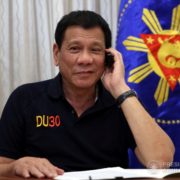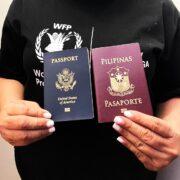2016 has been a year full of political shocks and surprises.
For instance, the news of Brexit dropped like a bombshell, not only to the European community, but to other nations across the globe as well. Britain suddenly quitting the European Union has never been part of this year’s expectation checklist.
Apart from Britain, Philippines also shocked the world as the country’s new leader, President Rodrigo Duterte, who won the recent May 2016 elections in a landslide victory, lambasted the United States and its present leader, President Barack Obama, due to the latter’s alleged unwelcome interference with the affairs of the Philippine government. This certainly drew a giant question mark over the decades-long friendship of the two countries. But more than that, it was beyond the imagination of Filipinos and Americans, much less of other nations, that President Duterte would attack the U.S. and its leaders with vulgar-laced speeches constantly to the point that it’s somehow not surprising anymore.
United States, on their part, also contributed to the 2016’s totally unexpected events list. Two months before the end of the year, U.S. also pitched the world a postscript upset: Donald Trump, nominee of the Republican party, won the 2016 U.S. presidential elections against the Democratic party’s nominee, Hillary Clinton. It is indeed normal that a country gets new officials after an election but Trump’s electoral pronouncements certainly warned the globe that there’ll be serious changes within America itself, and, to the worry of some nations, America’s relationship with other countries, taking note that the United States, as a superpower, has great global impact in different matters–particularly in areas of economics and military.
With President-elect Trump’s “make America great again” campaign, the question mark on the relationship between the Philippines and the United States thickens. Will it be a mark of a fresh and friendlier start, or will it be a pure bad news?
Foreign Policies
Trump wants to push for a stricter immigration policy.
For Filipinos, perhaps one of the most startling among Trump’s electoral pronouncements was his immigration policy, considering that there’s a large number of Filipino immigrants in the United States–not to mention that it is common for most Filipinos to look at America as an ideal place to work or live.
According to U.S. Ambassador to the Philippines Philip Goldberg last October, there are about 3.5 million Filipino-American citizens the United States. The data from the Philippine Department of Foreign Affairs also revealed that there were about 3.18 million Filipinos residing the U.S. as of December 2015.
Statistics show that about 10% of the Philippines’ gross domestic product (GDP) comes from the remittances of overseas Filipino workers (OFWs). Goldberg previously said that about 43% of these remittances comes from Filipinos who were in the United States.
Trump, wanting to “bring back” the jobs to the Americans that were “stolen” by immigrants, has been firmed that his future administration’s priorities include the deportation or imprisonment of about 3 million undocumented immigrants living in the U.S.
The Philippine government, on its part, however, downplayed it, declaring that it’s not a cause of big worry. Whether Trump would pursue a stricter immigration policy or not, the Philippines’ Department of Labor and Employment (DOLE) said it would only have “minimal effect” since most OFWs in the United States are legally employed. The Philippines’ Department of Foreign Affairs (DFA) also made a similar statement, saying that Trump’s immigration pronouncements do not have a ‘calamitous impact’ on the Filipino community in the United States.
Latest record from the Commission on Filipinos Overseas (CFO) shows that only about 271,000 Filipinos were irregulars or undocumented as of December 2013. Still, DOLE urged undocumented Filipinos to return to the Philippines before Trump assumes office in January of next year.
While currently most of Filipino immigrants were marked “safe” under Trump’s immigration policy, it would be no doubt, more challenging, not only to Filipinos, but to other nationalities as well, who wanted to migrate in the U.S.
Trade and Investment Policies
Goldberg previously stated that the United States has been the largest private foreign investor in the Philippines, as well as largest private employer and largest exporter. With Trump’s centralized America investment policies, this could prove to have a great impact in the Philippines’ economy.
Business Process Outsourcing (BPO) has been arguably one of the most high-paying jobs in Philippines, and its contribution to the economy has been nearly on par with the contributions of the OFWs over the recent years. But when Trump’s presidential victory was announced, several Filipino economic analysts pointed out that the BPO sector in the Philippines might be greatly affected, and it’s in a negative way.
According to the Bangko Sentral ng Pilipinas, 70% of BPO revenues were sourced from the U.S. and BPO sector is possibly at a great risk because of Trump’s earlier pronouncements to restrict the America’s outsourcing of products and services to generate more jobs for Americans. In fact, there has been reports that some American accounts has pulled out from several customer service companies in the Philippines following Trump’s win.
Despite that, Philippines’ National Economic and Development Authority (NEDA) Director General Ernesto Pernia argued that Trump won’t be able to directly order companies to pull out their business from other countries. Pernia said that most of the U.S. companies investing in the Philippines were run by private sectors, explaining that it’s the decision of the firms and not the government, where their investments would go.
Meanwhile, when it comes to trade, Philippines might have to adjust its export map if Trump would implement a stricter trading policies, which has also been part of his electoral pronouncements. Latest records from the Philippine Statistics Authority shows that the U.S. has been second among the top Philippine destination for exports, following Japan. 15.7% of Philippine exports goes to the United States while 21.1% goes to Japan.
But amid possible financial concerns, the Philippines’ chief economist, however, recently said that President Duterte’s pivot to China acts as ‘safety net’ for the country’s economy.
President Duterte previously announced his intent to severe ties with the U.S. and pursue an independent policy that is geared towards China and other countries in Asia, as well as Russia.
Pernia said that Philippines’ diversifying of its friendship prevents the nation from ‘crashing’ when a foreign country being depended on is in ‘trouble.’
Last October, President Duterte announced upon his arrival from his state visit to China that he secured a $24 billion worth deal with Beijing that would generate 2 million jobs for Filipinos in the next five years. Philippine Trade and Industry Secretary Ramon Lopez also said that Russia committed to boost its imports from the Philippines to about $2.5 billion from its its current $46-million worth of purchases.
Duterte and Trump
For some analysts, Trump’s win may be ‘bad for the Philippines’ but considered ‘good for Duterte,’ pointing out the two leaders’ seemingly similar temperament.
Over the past few months, the newly-elected Philippine president has been issuing controversial statements against the United States.
Duterte has previously cussed President Obama and the U.S. in some of his public speeches. He also expressed his intent before to scrap some joint military exercises with foreign countries, particularly with the United States. And perhaps, one of his most controversial announcements was when he said that he wanted the Philippines to ‘separate’ from the U.S. and pursue an independent policy.
The crackdown on illegal drugs to prevent the Philippines from becoming a “narco-state” has been among Duterte’s main presidential campaign promise, earning him a landslide victory in the recent May 2016 elections. Police records show that around 4,000 people have been killed in the Philippines since Duterte took office on June 30 in relation to the government’s war on narcotics — 1,800 of which were shot dead during legitimate police operations and about 2,600 by unknown suspects.
The United States, on their part, has continuously urged the Philippine president to stop the killings, which possibly have triggered President Duterte’s series of anti-U.S. rhetorics. But when Trump’s victory was announced, Duterte’s tone toward the United States seemed to sound more friendlier.
Although Duterte said he would maintain Philippines’ shift to other Asian countries, he remarked that he is looking forward to work with the incoming Trump administration for ‘enhanced Philippines-U.S. relations’ that would be anchored on ‘mutual respect, mutual benefit and shared commitment to democratic ideals and the rule of law.’
Relating what happened during the recent Asia-Pacific Economic Cooperation (APEC) summit in Peru, Philippines’ Foreign Affairs Secretary Perfecto Yasay Jr. also said that President Obama told him that he is expecting a better and stronger relationship between the Philippines and the United States under the new administration of President-elect Trump.
With Trump, who doesn’t seemed to show as much concern as other world leaders to the local concerns of other countries compared to its predecessors, such as Duterte’s war on drugs, a reboot possibility for fresher relationship between the Philippines and the United States has been hoped. And speaking of Trump’s likeliness to be focused more in America and deal less with other countries, territorial disputes in Asia-Pacific would no doubt be also put in a great uncertainty.
History teaches us that not all electoral promises were kept by victorious politicians. But at the same time, history teaches us too that tides can change, and even a single event can upset the normal path of currents. As of now, how would Trump’s administration really affect the Philippines remains unclear. But without doubt, whether we like it or not, directly or indirectly, it will affect the Philippines and the globe in different aspects–some, just how most analysts predicted it through his pronouncements and personality, while some, perhaps, in other unexpected circumstances.





